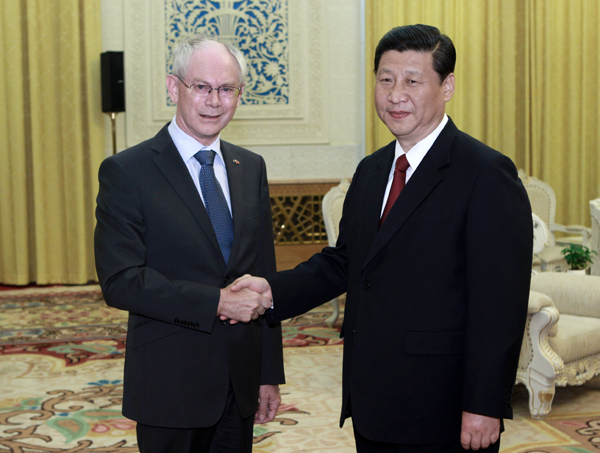World leaders ponder future of partnership
Updated: 2013-03-18 07:59
By Fu Jing in Beijing, Zhang Chunyan and Cecily Liu in London and Li Xiang in Paris (China Daily)
|
||||||||
 |
|
"I appreciated Xi Jinping's knowledge of the EU's way of working and his clear support for the improvement of the EU-China Strategic Partnership." |
Foreign politicians are looking to China's new leaders for clues on the direction of the world's second-largest economy.
As President Xi Jinping, Premier Li Keqiang and the other members of China's new leadership team get down to work, politicians and influential thinkers across the globe have speculated about the direction in which Xi and his colleagues will lead the world's fastest-emerging power.
In response, China's new leaders signaled their views about cooperation and peaceful development during a series of conference calls with the leaders of the United States, Russia, France, Germany, India and other countries directly after their election and endorsement process ended on Sunday, as the annual session of the National People's Congress came to a close.
Politicians overseas have been considering these questions since they watched the leadership transition in China, which began in November, when the new Party leadership was elected at the 18th National Congress of the Communist Party of China and Xi replaced Hu Jintao as the country's top political leader. The past few days have seen changes to the composition of the nation's highest legislative body, political advisory body and cabinet. Faced with such a massive reshuffle, top politicians overseas are curious about the reforms and policy changes the new leadership may implement to cope with the mounting challenges of economic restructuring and social issues. Meanwhile, they are also keen to see how any new policies will affect their economic activity with China.
Moreover, amid growing global interdependence, foreign politicians, especially those in the European Union, are also eager to learn what new input the leadership will provide for the global role of the world's most-populous nation and second-largest economy.
The challenges facing Xi and Li are huge, said Herman Van Rompuy, president of European Council, in an exclusive interview with China Daily. China has achieved extraordinary results since it began the policy of reform and opening-up and lifted hundreds of millions of people out of poverty. However, the economic, social and environmental challenges are still enormous, and are linked with the magnitude and the speed of the progress made in the past 20 years.
"The Chinese Government has now embarked on a difficult, but necessary, process to move from an export-led economy to a domestic consumption- and welfare-oriented model," said Van Rompuy.
He urged China's new leadership to address social disparities, wealth distribution and the environmental challenges.
Urbanization challenge
For Romano Prodi, former president of the European Commission, Xi and Li's priority should be to focus on urbanization. "China is experiencing such big challenges. The priority in this phase is how to manage the greatest process of urbanization ever undertaken in history," he said.
Official statistics show that the urbanization rate in China is approximately 50 percent, and in the coming decade, more than 300 million people, roughly equivalent to the size of the US population, will move to the cities.
"China is facing huge environmental and resource constraints in this regard," said Prodi, who added that the development of medium-sized urban areas is of crucial importance and a more pressing issue than the development of larger metropolitan areas. "But this is a project that will require a great deal of skill and lots of political unity," said the former Italian prime minister.

 Li Na on Time cover, makes influential 100 list
Li Na on Time cover, makes influential 100 list
 FBI releases photos of 2 Boston bombings suspects
FBI releases photos of 2 Boston bombings suspects
 World's wackiest hairstyles
World's wackiest hairstyles
 Sandstorms strike Northwest China
Sandstorms strike Northwest China
 Never-seen photos of Madonna on display
Never-seen photos of Madonna on display
 H7N9 outbreak linked to waterfowl migration
H7N9 outbreak linked to waterfowl migration
 Dozens feared dead in Texas plant blast
Dozens feared dead in Texas plant blast
 Venezuelan court rules out manual votes counting
Venezuelan court rules out manual votes counting
Most Viewed
Editor's Picks

|

|

|

|

|

|
Today's Top News
Boston bombing suspect reported cornered on boat
7.0-magnitude quake hits Sichuan
Cross-talk artist helps to spread the word
'Green' awareness levels drop in Beijing
Palace Museum spruces up
First couple on Time's list of most influential
H7N9 flu transmission studied
Trading channels 'need to broaden'
US Weekly

|

|







